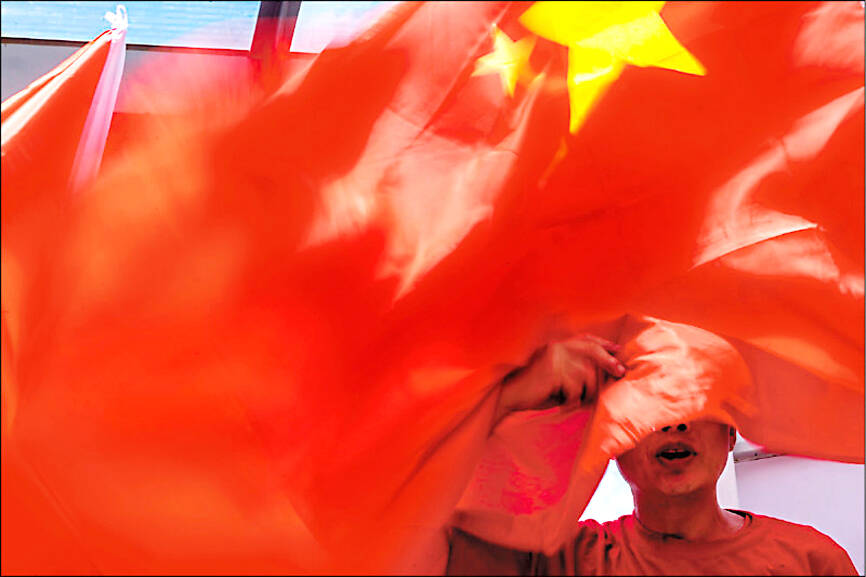Taiwanese rapper Chen Po-yuan (陳柏源) in a video showed how the Chinese Communist Party (CCP) bribes Taiwanese online influencers in its “united front” efforts to shape Taiwanese opinions.
The video was made by YouTuber “Pa Chiung (八炯)” and published online on Friday.
Chen in the video said that China’s United Front Work Department provided him with several templates and materials — such as making news statements — with some mentioning Chinese Nationalist Party (KMT) politician Hung Hsiu-chu (洪秀柱) and New Taipei City Mayor Hou You-yi (侯友宜) and asking him to write a song criticizing the Democratic Progressive Party.

Photo: Bloomberg
He said he had produced content for China as requested, but did not receive the royalties as promised by a Beijing-based management company for his song Chinese Bosses (中國老總), which is sung in an exaggerated Taiwanese accent with lyrics implying a pleasant life for businesspeople in China.
Chen said he also founded a company in China jointly with a business partner from the Jinjiang Taiwan Compatriots Friendship Association, who worked as his manager and later poached all his employees and capital invested in the company.
He was labeled as a fraud and a “Taiwanese independence separatist,” and attacked by Chinese Internet trolls, after he released an online video condemning his former business partner for betraying him.
“I finally realized the hard way that where I was staying [China] was not a place of democracy,” Chen said, adding that there is a huge difference between democratic Taiwan and autocratic China.
The Mainland Affairs Council yesterday said it is in control of the situation where Taiwanese influencers allegedly vilify the government’s policies, lure Taiwanese to work in China or engage in “united front” campaigns requested by the Chinese government.
The National Security Act (國家安全法) prohibits people from engaging, initiating, funding, hosting, manipulating, directing or developing an organization for a foreign country, including China, Hong Kong and Macau, external hostile forces, or any type of organizations, institutions, or groups established or controlled by them, or a representative dispatched by such organizations, institutions or groups, the council said.
The Anti-Infiltration Act (反滲透法) prohibits people from receiving instructions, being commissioned or funded by external hostile forces to engage in activities that disrupt social order, spread disinformation or interfere with elections, it said.
Article 33-1 of the Act Governing Relations Between the People of the Taiwan Area and the Mainland Area (臺灣地區與大陸地區人民關係條例) prohibits individuals, juristic persons, organizations or other institutions from engaging in any form of cooperation with the Chinese military, political parties or any organization of a political nature, it added.

DAREDEVIL: Honnold said it had always been a dream of his to climb Taipei 101, while a Netflix producer said the skyscraper was ‘a real icon of this country’ US climber Alex Honnold yesterday took on Taiwan’s tallest building, becoming the first person to scale Taipei 101 without a rope, harness or safety net. Hundreds of spectators gathered at the base of the 101-story skyscraper to watch Honnold, 40, embark on his daredevil feat, which was also broadcast live on Netflix. Dressed in a red T-shirt and yellow custom-made climbing shoes, Honnold swiftly moved up the southeast face of the glass and steel building. At one point, he stepped onto a platform midway up to wave down at fans and onlookers who were taking photos. People watching from inside

A Vietnamese migrant worker yesterday won NT$12 million (US$379,627) on a Lunar New Year scratch card in Kaohsiung as part of Taiwan Lottery Co’s (台灣彩券) “NT$12 Million Grand Fortune” (1200萬大吉利) game. The man was the first top-prize winner of the new game launched on Jan. 6 to mark the Lunar New Year. Three Vietnamese migrant workers visited a Taiwan Lottery shop on Xinyue Street in Kaohsiung’s Gangshan District (崗山), a store representative said. The player bought multiple tickets and, after winning nothing, held the final lottery ticket in one hand and rubbed the store’s statue of the Maitreya Buddha’s belly with the other,

Japan’s strategic alliance with the US would collapse if Tokyo were to turn away from a conflict in Taiwan, Japanese Prime Minister Sanae Takaichi said yesterday, but distanced herself from previous comments that suggested a possible military response in such an event. Takaichi expressed her latest views on a nationally broadcast TV program late on Monday, where an opposition party leader criticized her for igniting tensions with China with the earlier remarks. Ties between Japan and China have sunk to the worst level in years after Takaichi said in November that a hypothetical Chinese attack on Taiwan could bring about a Japanese

‘COMMITTED TO DETERRENCE’: Washington would stand by its allies, but it can only help as much as countries help themselves, Raymond Greene said The US is committed to deterrence in the first island chain, but it should not bear the burden alone, as “freedom is not free,” American Institute in Taiwan Director Raymond Greene said in a speech at the Institute for National Defense and Security Research’s “Strengthening Resilience: Defense as the Engine of Development” seminar in Taipei yesterday. In the speech, titled “Investing Together and a Secure and Prosperous Future,” Greene highlighted the contributions of US President Donald Trump’s administration to Taiwan’s defense efforts, including the establishment of supply chains for drones and autonomous systems, offers of security assistance and the expansion of